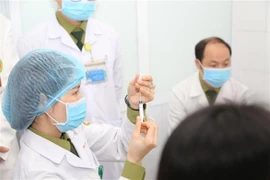 Medical staff at Soc Trang General Hospital in the southern province of Soc Trang receive COVID-19 vaccines (Photo: VNA)
Medical staff at Soc Trang General Hospital in the southern province of Soc Trang receive COVID-19 vaccines (Photo: VNA)Itstressed that these incidents are serious, but a very rare andunusual complication that seems to occur more among women younger than 60 yearsold.
Theincidents that take place after administering COVID-19 vaccines by AstraZenecaand Johnson & Johnson were documented by drug authorities and vaccinesafety monitoring agencies in many countries, the ministry noted.
Theclinical symptoms – including lasting serious headaches, seizures, breathingdifficulties and chest pains, abdominal pains, pain and oedema of the lowerextremities, but rarely bleeding or skin haemorrhage or internal bleeding –show within four to 28 days after being administered the vaccine.
Imagingdiagnostics – such as ultrasound and pulse doppler – of sites with clinicalmanifestations such as abdomen or the limbs can show thrombosis. X-raying andcomputed tomography (CT) or magnetic resonance imaging (MRI) scans at suspectedsites such as in the brain, lung, or painful areas etc. can show signs ofthrombosis or bleeding.
TheMinistry of Health said that commune- and ward-level health stations anddistrict-level medical centres must monitor people who have received theCOVID-19 vaccines, and if the injected person shows any of clinical symptoms,medical staff must perform “emergency measures” and transfer thepatient to the higher-level health facilities.
Healthcentres are also told to conduct a platelet count, imaging and X-rays onsuspected patients to diagnose the underlying conditions, and contact expertsfor those with abnormal symptoms.
Vaccinatedpersons who suffer from severe headaches, localised neurological symptoms,seizures, difficulty breathing, chest pain, life-threatening bleeding shouldalso be transferred to higher level.
Provincial-and municipal-level health facilities need to conduct tests and treatment ofprobable conditions that may be encountered in line with diagnosis andtreatment guidelines of the Ministry of Health. If the patient’s conditionprogresses beyond the capacity of their diagnosis and treatment, it isnecessary to consult a specialist or to refer to the higher-level medicalfacilities.
Central-levelhospitals are supposed to receive the patients with severe reactions tovaccinations, and consult experts for treatment if necessary.
Minister ofHealth Nguyen Thanh Long issued Decision No. 1888/QĐ-BYT on April 15 toestablish a steering committee for safe COVID-19 vaccination, which comprisesof senior officials from the ministry and leaders of the ministry’s relateddepartments along with Vietnam’s leading experts and scientists in diversefields from immunisation, infection, emergency resuscitation, intensive care,to haematology, cardiology and neurology.
The steering committeeis tasked with guiding medical establishments in performing screening,monitoring and handling of adverse events following COVID-19 vaccinations andpromptly assist localities in handling all situations safely.
Dao Xuan Co,Chairman of the Vietnam National Association of Emergency, Intensive CareMedicine and Clinical Toxicology, and Deputy Director of Bach Mai Hospital, thelargest first-tier public hospital in the northern region, said thatpost-vaccination blood clot incidents could be handled just like any othercommonly occurred blood clot.
Co reassuredthat the public could have “peace of mind” for receiving the COVID-19 vaccinegiven the very small risk, and even if such an incident does happen, theexpertise of leading scientists would be available to intervene in a timelymanner.
However, giventhe nature of the COVID-19 vaccine approved for emergency use, Vietnam has beenquite cautious in its vaccination drive.
“We do screeningand counselling before the administration of the vaccine," Cosaid.
"Theinjected person is monitored at the vaccination site for at least 30 minutes,then continues to be monitored at home for at least 24 hours and follow-upobservations for another three weeks after injection. Hospitals are alwaysready to prevent severe reactions after injection.”
According to areport of the National Expanded Programme on Immunisation released on April 27,a record of 50,104 people were inoculated on April 26.
Nearly 260,000people – mostly frontline workers and medical staff – in 42 provincesand cities have been inoculated using AstraZeneca vaccines since the nationalvaccination drive began on March 8.
No rare bloodclot incidents have been recorded so far, while the typical reactions(tiredness, mild fever, muscle pains, etc.) were reported in about 30 percentof the vaccinated, even lower than the advisory from the manufacturer orEuropean authorities’ reports.
The countrycurrently has nearly 1 million doses of AstraZeneca vaccine (combineddeliveries from the manufacturer and supplied via the COVAX Facility), alongwith 1,000 doses of Sputnik V vaccine as gift from Russia./.




























